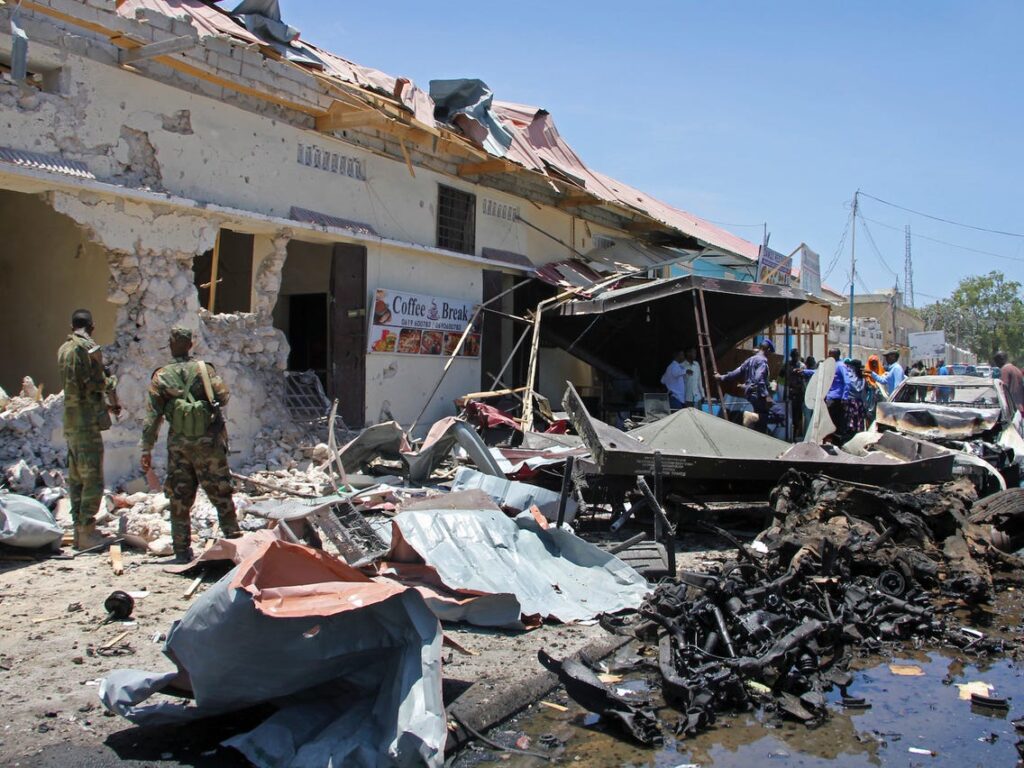
Discussions about the dangers of climate change tend to focus on economic impacts and vulnerabilities.
The pandemic has also illustrated the increased likelihood of new contagions in a world where human activity relentlessly encroaches into nature. The heightened risk for terrorism and extremist violence, however, receives much less attention.
One notable study by US economists found that a local temperature rise of 0.5°C is associated with a 10%-20% increase in the risk for deadly conflict. This should sound alarm bells for Africa.
The continent is among those being hardest hit by climate change and already has all the underlying variables that generate insurgencies and inter-communal fighting.
From acute poverty, ethnic tensions, and abusive and corrupt ruling parties, to a thriving black market for small arms and vast rural spaces that are barely governed, if governed at all.
Meanwhile, climate change is accelerating. National climate policies submitted to the UN ahead of the COP26 climate summit in November are “nowhere near” ambitious enough to achieve the Paris Agreement goal of holding global warming below 1.5°C, according to secretary-general António Guterres.
Elsewhere, new research published in the journal Nature Geoscience in March has found that spiking heat and humidity levels in tropical regions are quickly nearing the upper limits suitable for human life. This includes almost all of Sub-Saharan Africa, from the Sahel down to southern Zambia.
As climate change worsens, more destructive storms, heatwaves, floods and droughts will render swathes of Africa unfit for farming, tourism, and commercial development. Joblessness will skyrocket.
The World Bank has warned that climate change threatens to push tens of millions of people into poverty across Africa, a region where the majority of the population two decades from now will still be in their thirties.
This dynamic has been fast-tracked by the pandemic, which might wipe out much of the continent’s fitful progress in poverty alleviation thus far.
Unable to provide for themselves through subsistence farming or securing jobs in desperate and overcrowded labour markets, unemployed and alienated youth — economically adrift and incapable of fulfilling strong cultural expectations of raising a family — will be vulnerable to radicalisation and recruitment by malicious actors.
The same is true for some of the more than 18-million internally displaced people across the region and more than 6-million refugees, many whom have little hope of returning home.
Outcomes of climate change, such as increased water stress, mass internal displacement and greater food insecurity, will also place far more pressure on Africa’s weak state institutions, and corrupt governments prone to abuses of power when protecting ruling party interests.
Western-backed autocratic regimes, such as those in Egypt, Chad, Uganda and elsewhere, are quick to label protests and public dissent as acts of terror or subversion, invoking heavy-handed responses from state security forces.
This creates a vicious cycle where foreign-funded, state-sanctioned violence provides a precious recruiting tool for rebels, militias, extremists and terrorist groups.
Human rights watchdogs have documented hundreds of deaths and forced disappearances over the past several years by security forces in Burkina Faso, Mali and Niger as part of military crackdowns on terrorist groups in the Sahel.
Similar allegations of summary killings and executions, torture, rape and razing of property have been routinely levelled at government forces battling Boko Haram in Nigeria, political opponents in Burundi, anglophone separatists in Cameroon, rebel groups in South Sudan, and now Islamist militants in Mozambique.
Such atrocities and persecution may increase as more African governments acquire drone capability and cyber surveillance tools without placing any oversight on their uses. Militant groups will also find expanding safe havens in the form of ecological wastelands created by climate change and abandoned by the state.
Jihadists across the Sahel, and Al-Shabaab in Somalia, for example, have proven effective at ingratiating themselves in marginalised rural communities by filling governance vacuums through resolving local disputes or providing protection from bandits, along with basic goods, administration and casual work.
Together this poses a lingering security and economic risk not only for the African continent, but the wider world.
In the same way that failing to vaccinate populations in developing nations against Covid-19 will allow the virus to mutate into more dangerous variants, the proliferation of militant groups in Africa’s unpoliced climate dead zones will constitute a global security threat and disrupt resource development, supply chains and investment decisions.
The Democratic Republic of Congo (DRC), for example, contains an estimated 70% of the world’s cobalt and other vital minerals used to produce electronics and zero emissions green technology.
But those reserves are virtually impossible to access in a responsible way given how they lay within a restive region that contains a complex network of more than 100 different militant groups.
Likewise, both Al-Qaeda and the Islamic State have established footholds in Africa from which they continue to broadcast propaganda, gain affiliates, stage attacks and inspire followers around the world.
There are no easy solutions for mitigating this impending rise in African conflict. Though an overarching strategy should be to lessen the poverty and hopelessness that make radicalisation appealing.
Donor countries, creditors and multilateral institutions could assist and incentivise African governments to crack down on the $89bn (about R1.3-trillion) in illicit financial flows that are spirited away from the continent every year.
Redirecting development aid from giant multinational nongovernment organisations towards grassroots, African-led organisations on the ground would build more permanent economic and social resiliency.
Climate finance from the global north also needs to shift from focusing predominantly on emissions reduction initiatives towards funding climate change adaptation, including new skills development programmes in areas dominated by subsistence farming.
While climate change is sure to produce a new wave of African conflict, the degree to which it spreads can still be curtailed. Doing so should matter to everyone.











